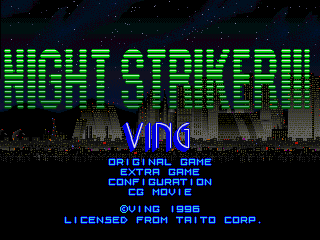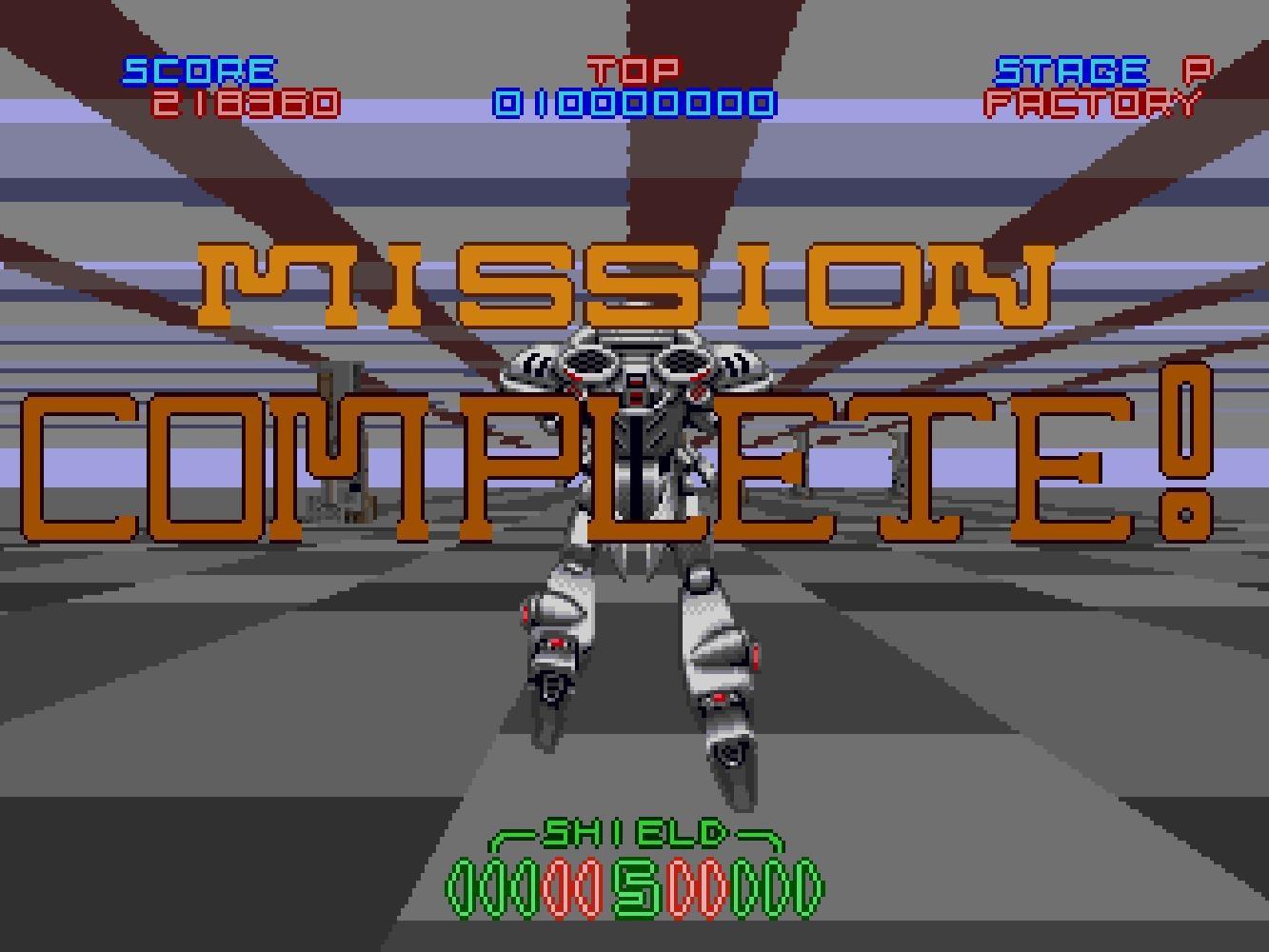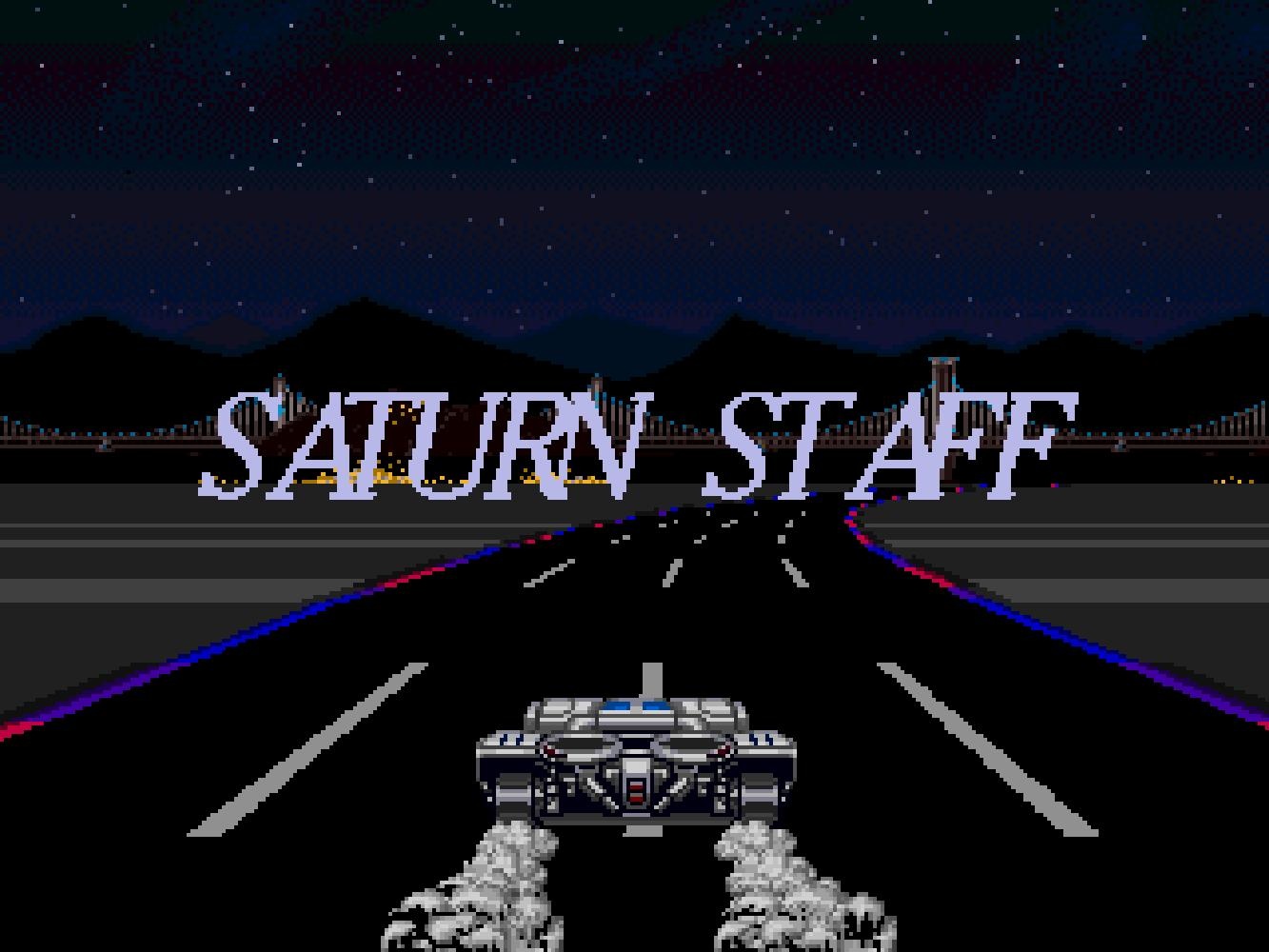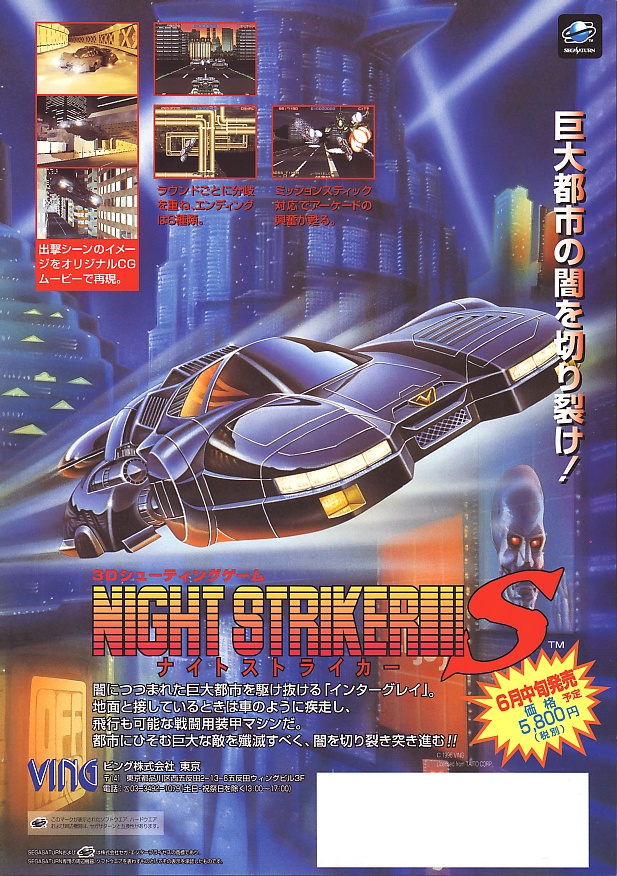Difference between revisions of "Night Striker S"
From Sega Retro
| Line 19: | Line 19: | ||
| otherformats={{NonSega|Arcade|PS}} | | otherformats={{NonSega|Arcade|PS}} | ||
}} | }} | ||
| − | {{stub}}''''' | + | {{stub}}'''''{{PAGENAME}}''''' (ナイトストライカーS ) is an arcade game developed by [[Taito]]. It is a futuristic on-the-rails shooter which plays similarly to [[Sega]]'s ''[[Space Harrier]]'', with the player piloting a hover vehicle. |
| − | |||
==Story== | ==Story== | ||
| − | + | The game is set in a futuristic city in 2049. A terrorist organisation has kidnapped Doctor Masker Lindberry and his daughter. The United Nations Special Service Agency has dispatched their agents to investigate, but to no avail. Its leader is leading a task force, code-named Night Striker, using armoured vehicles to rescue them and destroy the organisation. | |
==Gameplay== | ==Gameplay== | ||
| − | {{ | + | The game is a rail shooter with a 3D perspective. The player controls a hover car and shoots enemies encountered during the stage. The car moves by holding in any direction with the D-Pad. The vertical controls are inverted, so {{down}} ascends and {{up}} dives. The car positions itself back in the center of the screen when the player is not holding a direction. The player does not control the speed at which the car travels through the stages. The car shoots with {{A}}, {{B}}, or {{C}}; {{A}} can be held for continuous fire. |
| + | |||
| + | At the end of each stage, there is a boss. After it is defeated, the player is presented with a choice between two routes, like ''[[OutRun]]''. There are 21 stages, but the player only needs to complete 6 to complete the game. Stages repeat themes and bosses. Certain stages contain obstacles such as barriers which must be maneuvered around. In the final stages, the car transforms into different vehicles such as a motorbike or a robot. The game features different endings depending on which route is taken. | ||
| + | |||
| + | The car has a shield that can absorb a certain number of hits before being destroyed. The car is harmed by enemy fire or running into obstacles, but it is not harmed by touching walls or ceilings. The player is given another shield point after completing each stage. If the shield has run out, the car can sustain one more hit before it is destroyed and the game is over. The game can be continued if the player has credits remaining. | ||
==Versions== | ==Versions== | ||
The Sega Saturn version has clearer visuals and supports the [[3D Control Pad]] and [[Mission Stick]] for analogue control; the original arcade cabinet uses a flight stick similar to the Mission Stick. This version includes a bonus mode with six exclusive stages, though this mode does not have branching paths. | The Sega Saturn version has clearer visuals and supports the [[3D Control Pad]] and [[Mission Stick]] for analogue control; the original arcade cabinet uses a flight stick similar to the Mission Stick. This version includes a bonus mode with six exclusive stages, though this mode does not have branching paths. | ||
| − | |||
| − | |||
==Production credits== | ==Production credits== | ||
Revision as of 05:05, 14 June 2023
- For the Sega Mega-CD game, see Night Striker.
| Night Striker S | ||||||||||
|---|---|---|---|---|---|---|---|---|---|---|
| System(s): Sega Saturn | ||||||||||
| Publisher: Ving | ||||||||||
| Developer: Fill in Cafe | ||||||||||
| Licensor: Taito | ||||||||||
| Original system(s): Arcade boards | ||||||||||
| Sound driver: SCSP/CD-DA (18 tracks) | ||||||||||
| Peripherals supported: 3D Control Pad, Mission Stick | ||||||||||
| Genre: 3D Shooting[1], Shooting[2] | ||||||||||
| Number of players: 1 | ||||||||||
| ||||||||||
|
This short article is in need of work. You can help Sega Retro by adding to it.
Night Striker S (ナイトストライカーS ) is an arcade game developed by Taito. It is a futuristic on-the-rails shooter which plays similarly to Sega's Space Harrier, with the player piloting a hover vehicle.
Contents
Story
The game is set in a futuristic city in 2049. A terrorist organisation has kidnapped Doctor Masker Lindberry and his daughter. The United Nations Special Service Agency has dispatched their agents to investigate, but to no avail. Its leader is leading a task force, code-named Night Striker, using armoured vehicles to rescue them and destroy the organisation.
Gameplay
The game is a rail shooter with a 3D perspective. The player controls a hover car and shoots enemies encountered during the stage. The car moves by holding in any direction with the D-Pad. The vertical controls are inverted, so ![]() ascends and
ascends and ![]() dives. The car positions itself back in the center of the screen when the player is not holding a direction. The player does not control the speed at which the car travels through the stages. The car shoots with
dives. The car positions itself back in the center of the screen when the player is not holding a direction. The player does not control the speed at which the car travels through the stages. The car shoots with ![]() ,
, ![]() , or
, or ![]() ;
; ![]() can be held for continuous fire.
can be held for continuous fire.
At the end of each stage, there is a boss. After it is defeated, the player is presented with a choice between two routes, like OutRun. There are 21 stages, but the player only needs to complete 6 to complete the game. Stages repeat themes and bosses. Certain stages contain obstacles such as barriers which must be maneuvered around. In the final stages, the car transforms into different vehicles such as a motorbike or a robot. The game features different endings depending on which route is taken.
The car has a shield that can absorb a certain number of hits before being destroyed. The car is harmed by enemy fire or running into obstacles, but it is not harmed by touching walls or ceilings. The player is given another shield point after completing each stage. If the shield has run out, the car can sustain one more hit before it is destroyed and the game is over. The game can be continued if the player has credits remaining.
Versions
The Sega Saturn version has clearer visuals and supports the 3D Control Pad and Mission Stick for analogue control; the original arcade cabinet uses a flight stick similar to the Mission Stick. This version includes a bonus mode with six exclusive stages, though this mode does not have branching paths.
Production credits
- Producer: Tohru Sugawara
- Director: Kenshi Kaito
- Software: Tohru Sugawara, Hideki Hashimoto, Toshiaki Tsukano, Tmr-Win Iromust, Takashi Kitabayashi
- Character: Kohzoh Igarashi, Minori Ishino, Yakako Kojima, Kenshi Kaito
- Hardware: Toshiyuki Sanada
- Electric: Tomio Takeda
- Mechanic: Tohru Yamamoto, Tohru Hirata, Tomio Suzuki, Nobuyuki Iwasaki
- Design: Shinobu Sekiguchi, Akio Nomura
- Sound: Music Composed, Mar., S.E Editor, Nui&Yasu, By Team Zuntata
- Executive Producer: Keisuke Hasegawa
- Special thanks to: Many Other People
- President: Ryozo Sugawara
- Director: Takashi Noto
- Programmer: Atsushi Taguchi, Nonchi, Takumi Amano
- Graphic: Naohiro Washio, Hiroaki Matsukawa
- CG Movie: Hisanori Saitou
- Data Management: Naoki Inaba
- Promotion And Manual Writer: Ryusei Baba
- Marketing: Junko Shiihashi
- Special Thanks: Taito Corporation, Yuu House Co., Ving Co., Team Zuntata, Kenshi Kaito, Masaya Konya, Toru Hosaka, Taka, Kanta Watanabe, Masayuki Kokubu, Tetsuya Tanabe, Yosuke Nakano, Toshiyuki Kikuchi, Kohshi Nagato, Yoshimasa Hagiwara, Goro Kashima, And You !!
Magazine articles
- Main article: Night Striker S/Magazine articles.
Promotional material
Physical scans
| Sega Retro Average | |||||||||||||||||||||||||||||
|---|---|---|---|---|---|---|---|---|---|---|---|---|---|---|---|---|---|---|---|---|---|---|---|---|---|---|---|---|---|
|
| 55 | |
|---|---|
| Based on 5 reviews | |
Technical information
- Main article: Night Striker S/Technical information.
References
- ↑ File:NightStriker Saturn JP Box Back.jpg
- ↑ 2.0 2.1 https://sega.jp/fb/segahard/ss/soft_licensee2.html (Wayback Machine: 2020-03-20 23:05)
- ↑ Sega Saturn Magazine, "1996-05 (1996-03-22)" (JP; 1996-03-08), page 27
- ↑ File:NightStrikerS Saturn JP SSEnding Or.pdf
- ↑ File:NightStrikerS Saturn JP SSEnding Ex.pdf
- ↑ MAN!AC, "08/96" (DE; 1996-07-17), page 56
- ↑ Saturn Fan, "1996 No. 13" (JP; 1996-06-07), page 153
- ↑ Saturn Fan, "1996 No. 16" (JP; 1996-07-19), page 84
- ↑ Sega Saturn Magazine, "1996-11 (1996-07-12)" (JP; 1996-06-28), page 230
- ↑ Sega Saturn Magazine, "Readers rating final data" (JP; 2000-03), page 15
| Night Striker S | |
|---|---|
|
Main page | Comparisons | Hidden content | Magazine articles | Reception | Technical information | |










